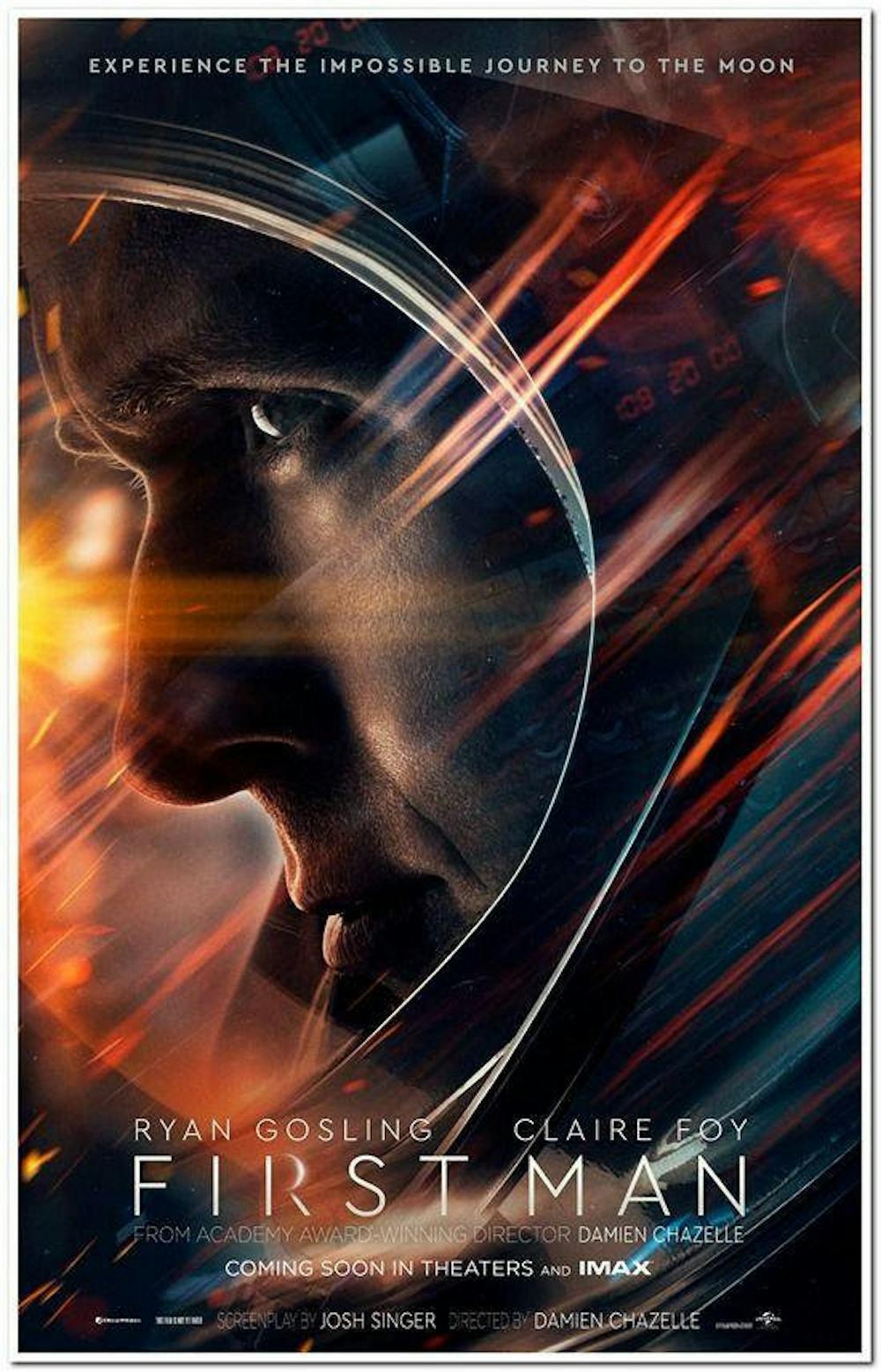Much like space travel itself, Damien Chazelle’s new film “First Man” (2018) is a venture into the unknown and an exploration of what is possible. Moving away from his previous films surrounding music, “Whiplash” (2014) and “La La Land” (2016), “First Man” is Chazelle’s first step towards a new genre of film, though it still holds true to the director’s roots of sound artistry. Although it is a film about space, and Neil Armstrong’s journey in particular, this film is primarily an experiment in pushing the limits of sound design; it comprises an experience that immerses its viewers through Justin Hurwitz’s carefully and meticulously crafted score, a symphony of beautifully contrasting swells and silences.
“First Man” follows astronaut Neil Armstrong (Ryan Gosling) through his hard-fought and embattled journey to be the first person to step foot on the moon. Everyone knows the end result, the famous words, but not everyone understands the work, the dedication, the long days and even longer nights that went into that walk on the moon. This film encapsulates that dedication and immerses the audience in such a way that they can, in some capacity, understand just how monumental an undertaking walking on the moon was. Now, looking back, we see it as a triumph of human will and a mark of success for American ideals. Before the moon walk, however, this grand achievement in human history was seen as a dangerous mission with seemingly little payoff.
For most space programs, especially those leading up to the Apollo mission in question, failure occurs far more often than success. “First Man” challenges its audience to view these astronauts as people, not simply as machines churning out mathematical answers.
During these moments in the film, after plans go awry, the score surges and the audience is forced to grapple with the repercussions of these monumental mistakes. Alarms shriek out into the theater, piercing the silence and forcing the viewers into attentiveness. The noises are jarring and unanticipated, causing the audience, with pounding hearts, to feel just as fearful as the astronauts. With every new flashing light and buzzing siren, the tension ratchets up, one notch at a time, until it simply ends with no warning into a serene yet unsettling silence. As the deafening silences cascade into gentle arrangements, the audience finds themselves alongside Armstrong, scrutinizing the screen for all of its incredible depth and detail.
Armstrong is a character marked by silence. Early in the movie, Chazelle establishes the death of Armstrong’s daughter Karen as a pivotal moment in his life. Throughout his daughter’s battle with cancer, Armstrong took meticulous notes, searching within the confines of the white notebook pages for answers to no avail. So, in the similar, seemingly impossible mission of landing on the moon, Armstrong will not allow himself to fail — not a second time. Such unyielding determination permeates every moment of the astronaut’s life. He simply cannot bear to fail, and when he does, he gets back up, just as energized as before.
For example, during the interview process for NASA, recruits partake in a series of trials and tasks in order to prove their ability to handle the difficulties of space. One of the most difficult tasks for astronauts is the 3-axis machine that spins astronauts in every direction imaginable, succumbing them to the G forces experienced in space. When Armstrong, the first recruit to use the machine, falls unconscious after his run, he does not simply leave the seat and lose the battle of will against the machine. He stays in the machine and demands a second go, a second chance to prove his tenacity.
Not only does Gosling’s stellar performance bring the character to life, it also adds a layer of depth. Armstrong was an astronaut, but also a father, who day in and day out had to leave his children at home with his wife and risk his life for the sake of the mission. Every morning he kisses his wife goodbye knowing full well that he may never return.
In the early morning hours, just as the sun is beginning to rise, Armstrong says goodbye to his wife and his two sons and embarks on the greatest exploration into the unknown the world has ever achieved.
The life of an astronaut is one of dedication and courage. Chazelle has crafted a film that achieves a raw and vulnerable understanding of the life of an astronaut, and it is precisely through his mastery of sound design that he does so. Hurwitz’s score is crucial to the success of this film and won’t soon be forgotten. Switching at will between the extremes of chaos and silence, the score at times instills courage, and fear at others. It makes the world of the film seem inhabited and robust, rather than one-dimensional and ungrounded. Whether it is a bombastic sea of noise or a tranquil melody that delights, “First Man” has a score that is sure to make any audience marvel.

Owen Mason-Hill ’22 is the Senior Arts & Culture Editor.
He previously served as a staff columnist, writing film reviews under the Reel Critic column. Mason-Hill is studying for a Film and Media Culture major, focusing his studies on film criticism and videographic essays.
His coverage at The Campus focuses primarily on film criticism, and has expanded to encompass criticism of other mediums including podcasts, television, and music under his column “Direct Your Attention.”




